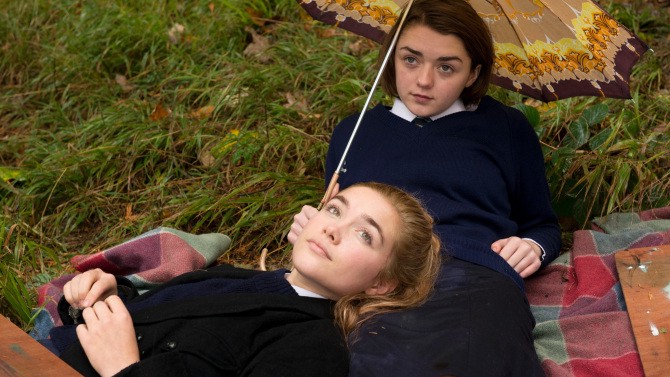There were no less than twelve female
members of the cast and crew on stage to introduce The Falling at its world premiere at the London Film Festival, and
it made for quite a sight. One of the most talked about women-directed films of
the festival, and one of three women-directed features (out of twelve) in Official
Competition, Carol Morley’s latest is a bold, compelling, and utterly inspiring
piece of work.
The film centers on an episode of
mass hysterical fainting at an all-girl school in England. The year is 1969, and
Lydia (Game of Thrones’ Maisie
Williams) and Abbie (newcomer Florence Pugh) are fellow pupils and best
friends. The school is presided over by the intimidating figure of Miss Alvaro (deliciously
portrayed by Monica Dolan) who, by all outward appearances, conforms to that
peculiarly English image of the stern and prudish spinster-headmistress who
stereotypically haunts such establishments.
While Miss Alvaro stalks the corridors — perennial cigarette hovering in manicured hand above stiff upper lip — the girls, and Abbie in particular, seek release from the staid and proper atmosphere engulfing them via acts of quiet rebellion. There was a burst of sympathetic laughter from the audience at the premiere as, in an early scene, Abbie was subjected to the indignity — commonplace in such institutions — of having one’s skirt measured to ensure it is not hanging too far above the knee (which, naturally, hers was), gazing with amusement at her classmates all the while, her indifference to authority palpable.
Abbie — by virtue of her abundant
confidence, intelligence, and beauty — is clearly someone to whom all the girls
are drawn, and no one more so than her best friend Lydia. Theirs is the archetypal
teen-girl friendship marked by an intense dependency. Yet Lydia feels Abbie is
beginning to drift away from her. Abbie has slept with someone, and Lydia feels
left out.
While Abbie extols the joys of “free love” and orgasms, Lydia sits
curled up and sulking inside a box-like aperture at the bottom of a built-in
wardrobe. It is an arresting image, which not only speaks volumes about Lydia’s
own inner turmoil, but irresistibly recalls the mysterious figure of her
agoraphobic mother (Maxine Peake), who hasn’t left the house for as long as
Lydia can remember, and whose difficult relationship with her daughter will
become more and more significant as the film unfolds.
Admirers of Carol Morley’s 2011
documentary feature Dreams of a Life — the
tragic story of Joyce Vincent, whose death in her North London studio went
unnoticed for three whole years — will recognize in The Falling a comparable empathy for women leading lives of quiet
desperation. One of Morley’s great talents as a filmmaker is her ability to build
up a complex picture of her characters from the smallest and most delicately
placed details.
Viewers’ perceptions of the forbidding Miss Alvaro might shift,
for instance, once they spot the portrait of Virginia Woolf, which takes pride
of place on her office wall, and they most certainly will after a brief but
oh-so-poignant exchange with Miss Mantel (Greta Scacchi), in which the
headmistress comments bitterly that if their teenage charges think themselves
misunderstood now, they are set for a rude awakening once they reach middle age.
As the narrative progresses, the suffocating veil of repression that obscures these
characters induces increasingly strange instances of fainting that erupt around the school. Abbie is the first to fall, and soon the weird sickness
has infected Lydia too. From Lydia, it spreads like wildfire, until most of the
school population is swooning uncontrollably.
Is it the physical manifestation of an
uncontainable sexual awakening? Or a conscious act of feminist revolt? Identifying
the precise significance of “the falling” is left to our imaginations. The film
boasts several moments of homage to Peter Weir’s Picnic at Hanging Rock, yet it is unquestionably Morley’s distinct
creation, and the same commitment to maintaining a sense of deliberate and
fascinating ambiguity that characterized Dreams
of a Life is very much in evidence here.
It is a strange, amorphous
animal — strains of Gothic melodrama and science fiction run throughout — and
the stunning cinematography of Agnès Godard (Claire Denis’ long-time
collaborator) makes for an all-the-more hallucinogenic experience. The haunting
score by artist Tracey Thorn (Everything
but the Girl) — her first composition for film — also contributes beautifully
to The Falling’s power to seduce and
move. This is a film highly deserving of praise and, indeed, multiple viewings.
Come spring next year, when it’s set for release, I’ll be one of the first in
line to fall for it all over again.







